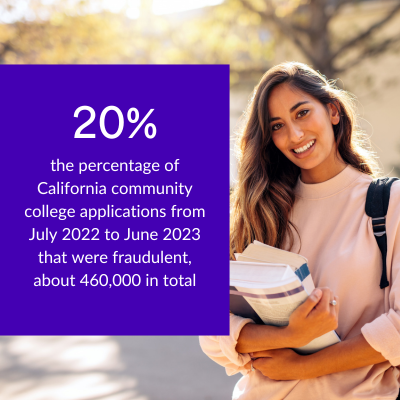Transforming Higher Education Fraud Prevention Through Innovative AI Technology
Transforming Higher Education Fraud Prevention Through Innovative AI Technology
Michigan and Massachusetts recently announced programs to cover the cost of community college for most high school graduates, joining over 30 states in offering government-funded tuition. Michigan introduced the Michigan Achievement Scholarship to cut tuition costs for recent high school graduates and expanded its Reconnect program, which supports adults aged 25 and older without postsecondary credentials. Massachusetts adopted a similar approach with a broader reach, providing tuition coverage for any student without a bachelor’s degree.
Although these initiatives open doors for students who couldn’t otherwise afford to pursue higher education, they also create new opportunities for fraud. Bad actors will capitalize on the expected increase in application volume–just as they did at the beginning of the pandemic when the rapid pivot to online classes made it easier for them to fly under the radar—and submit phony applications in hopes of stealing financial aid. In doing so, they not only prevent real students from accessing funding, but they also tie up seats in classes, hindering genuine students from enrolling.
An article in EdTech: Focus on Higher Education recently highlighted how the surge in “ghost students” is causing chaos on campuses, significantly impacting admissions and IT departments as they allocate extensive resources to tackle the problem.
In March 2023, the U.S. Department of Justice charged three women with orchestrating a ghost student fraud. They allegedly used the identities of prison inmates and others to enroll in a California community college, securing almost $1 million in federal student loans through their scheme.


Source: San Francisco Chronicle, “Thousands of ‘ghost students’ are applying to California colleges to steal financial aid. Here’s how,” June 4, 2023
To effectively identify and prevent fraud, colleges must first bring together data from a variety of systems, including admissions CRM, SIS, and LMS. Each of these systems contains information that, once viewed in context, indicates fraud. Voyatek’s Application Fraud Firewall consolidates data from our clients’ on-premises and cloud-based systems. Then, our fraud models use adaptive AI to look for patterns in the data and identify potentially fraudulent applications and actions.
Another reason our solution is so powerful is Voyatek’s integration of Socure’s cutting-edge digital identity verification and fraud prevention capabilities into Application Fraud Firewall. This integration significantly enhances the detection and prevention of fraud in admissions, financial aid, and enrollment processes.
When deploying Application Fraud Firewall for a new client, we tailor the model to detect characteristics specific to each institution’s profile. For instance, at many community colleges, applications predominantly come from in-state students, so an out-of-state application, especially when coupled with other factors, may prompt a staff review. We clearly present the factors that contribute to the fraud probability score for each application. Our commitment to transparency ensures the AI remains unbiased, as we provide clients with insights into the rationale behind decisions, maintaining accountability for all parties involved.
Though each implementation is unique, the solution detects fraud with proven, repeatable methods:
Applications are scored using multiple machine learning techniques to cover a range of scenarios
Explanatory scoring is produced to transparently describe algorithm output and direct mitigating actions
Results are fed back into the model to help it learn and identify changing patterns
On an ongoing basis the algorithm is further trained to incorporate confirmed and rejected cases of fraud from human validation

Our clients are seeing tremendous results with the Voyatek Application Fraud Firewall. After implementing this solution one client saw a nearly 80% reduction in manual admissions application review. College of the Canyons identified 96% of fraudulent financial aid applications in the first year, preventing about $172k in fraudulent payments.
Not sure you have a problem? Clients have found of 40% of their applications were fraudulent during our initial Fraud Health Check assessment. This is a slimmed down version of our typical implementation that leverages our standard models to identify the scope of the problem. If you decide to move forward with us, this modest investment will be applied towards your first module of Student Success Analytics.
Contact us at to learn more or to get started on a Fraud Health Check for your institution.
-John VanWeeren, VP, HIgher Education, Voyatek

